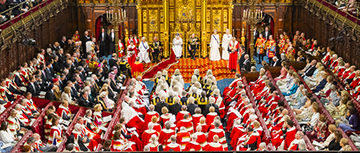On a Wednesday evening, liberals from across Cambridge gather to drink up and debate the issues of the day. We rarely take our motions, or each other, too seriously. In a room packed with liberally minded people, the result of one of these ‘Spirited Discussions’ motions came as a surprise to me. By a majority of two votes, the motion ‘This House believes we were wrong to accept Philip Lee’ passed. I think we were wrong and I would like to make a better case in his defence than I was able to, in a rushed, improvised speech on that night. I think we could have thought harder and have been more understanding of Lee. I don’t think we were wrong to accept him.
The two most prominent issues which have been used to show Philip Lee should not have been accepted as an MP by the Party were his abstention on the legalization of same sex marriage and the motion he tabled on proposing that migrants be screened for HIV, before entering the UK.
Tim Farron’s private view, according to his religious beliefs, was that same sex marriage should not be legalized. Nick Clegg came out in support of Farron, reminding us that we are all entitled to our private views but that, as policy makers, we have to recognize that private views are not always compatible with public policy. It was a Liberal Democrat who got the same-sex marriage legislation on the books during the Coalition. Her name is Lynne Featherstone, a fact that David Cameron seems to forget. Lee’s view was that same sex marriage should not be a matter of Parliamentary ruling and he called upon the Church to find a way to recognize same sex marriage. However much we may disagree with Philip Lee’s view, it is a legitimate one and importantly, not born out of prejudice or homophobia, and so despite the difference in voting record from other liberals, simply represents a divergent strand of liberalism; one whose focus was on the separation of Church and State.
The motion to screen immigrants for HIV/AIDS before they gain access to the UK is less clear-cut. Philip Lee worked as a doctor first hand with Sub-Saharan African patients who were unaware they had HIV and worked with the damaging fallout of late-diagnoses. Lee wanted to create a debate, his position being that it is a moral duty to screen immigrants of HIV so that they can be treated as soon as possible to help prevent the virus from spreading in the UK. As Layla Moran said, ‘it was a clinical decision’. It was also a politically pragmatic decision. Lee knew he was playing to the anti-immigrant sentiment of his seniors and other members of the Tory party by tabling the motion. This is not acceptable. However, again, is was not born out of prejudice or anti-immigrant sentiment. It was born of political, cynical, opportunism. So the question is not ‘how can we Lib Dems accept a prejudiced man? It is ‘can we accept a man who did such things to try to benefit his career?’. I think we can, because he has shown he has changed.
Despite a history of largely voting with the Tory Whip, Lee has done huge amounts for liberalism, even as a Tory MP. At Party Conference he spoke of his disgust toward Boris Johnson’s recent proposal to lock criminals up for longer. Lee worked as the Under Secretary of State for the Ministry of Justice, specializing in female offenders and promoting exercise within prisons as a means to escape patterns of crime. His approach was a liberal and progressive one. Lee spoke of his deep regret and fear that his work was being undone by those who proceeded him. Lord Marks worked with Lee when he held this role and said that, hearing Lee speak in meetings, he thought ‘there sits a great Liberal Democrat’- this was well before Lee crossed the floor.
Two valued members of the Liberal Democrat party resigned over Philip Lee’s acceptance into the party. The real issue was that they did not feel they had been able to have a conversation with Lee. They wanted to have had reassurance that he is liberal in his attitude towards gay and trans people. Members felt they should have been forewarned. The problem is, as a major political party, we have to engage with the political game. Had members been forewarned of Lee’s entrance into the party, the cat would have been let out of the bag and the Liberal Democrats would not have secured the media coverage they did. This is very important to achieve our aims, and enact our liberal values. To have filled people’s screen with news of an MP crossing the floor from the Tories to the Lib Dems on prime-time TV was brilliant; it crashed into Boris Johnson’s first few minutes of potential ‘honeymoon coverage’ (by the way he got less than the standard honeymoon polling bounce for a new PM). It was a win for the Liberal Democrats and what they stand for, at a vital time. In an ideal world, all members could have spoken to Lee before he crossed the floor. I am convinced, that if all members had spoken to Lee, they would have been overwhelmingly supportive and sure of his liberal credentials. As it was, we had to trust the vetting system we have put in place—not perfect, but not nothing either.
This house regrets the unforgiving treatment of Lee. We all should have celebrated him as a powerful example of someone who has changed their mind—for the good and better—especially at a time when we want people to know it is more than okay to say you were wrong and to change your mind, as many have about leaving the European Union. We should put our trust in our leader and her colleague. We should have seen the bigger picture, the fight we face against the far-right, and the hours Liberal Democrats across the UK put into getting MPs into the House of Commons.
The sentiment of ‘we don’t want him here’, and as some people have suggested, ‘let’s get rid of him’ is frighteningly illiberal: It is the sort of comment dealt by UKIP, the Brexit party and our Prime Minister, Boris Johnson. The two main parties are destroying themselves in a hunt for ideological purity—do we want to do the same?
What is more, we are implying that he cannot change—but on the key charge—that he did something cynical and careerist—could we have more evidence that he has changed? He voted again and again to avert no-deal, effectively ending his career within the Conservative Party, he has crossed the floor and plans to contend a seat he stands a slim chance of winning against the dinosaur John Redwood. These do not sound like the actions of an unchanged careerist.
To look at Lee only by his past voting record is to put a full stop to him as a person rather than a comma, or a semicolon. Human lives are not so easily compartmentalised, liberals are meant to understand that—we are all flawed and imperfect, liberalism is about finding ways to forgive each other, to let each other grow and change. We have to keep reminding ourselves how easy it is to prejudge, and bear in mind where that leads us—to tribalism and the politics of identity.
Accepting Lee does not say that you only care about good headlines, it says you believe in reform, in forgiveness, in taking people not just as they are, but as what they can be. To love others, and to be able to forgive them, is liberalism at its core and if you don’t think Lee especially stands for all that, you ought to believe that he can.



0 Comments